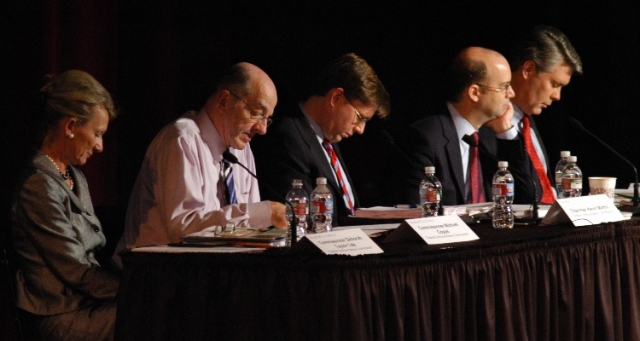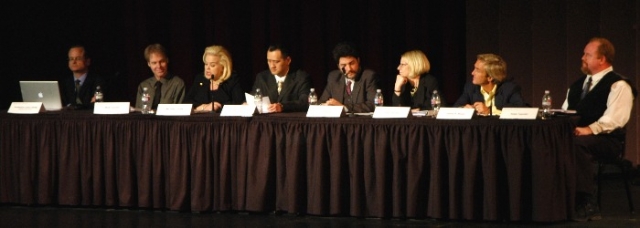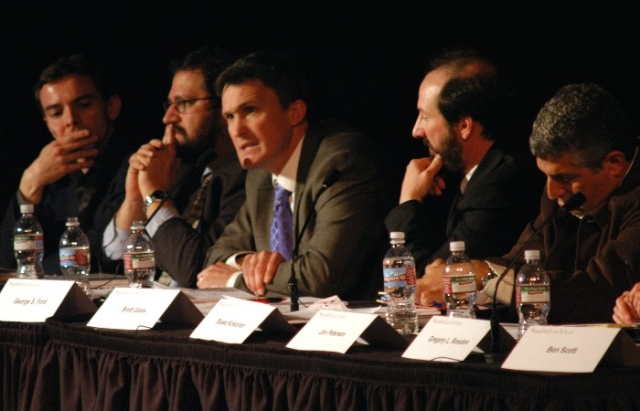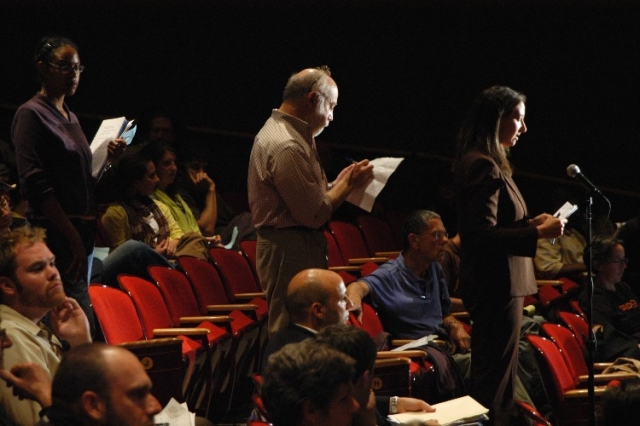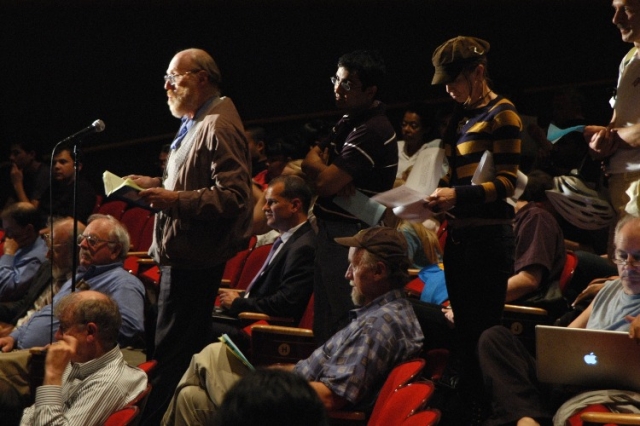From the Open-Publishing Calendar
From the Open-Publishing Newswire
Indybay Feature
FCC commissioners hear panelists, public overwhelmingly support net neutrality
Expert panelists and the public testified before the Federal Communications Commission on April 17, 2008 at Stanford University, overwhelmingly supporting network neutrality and transparency in the interest of democracy, freedom of speech, and right to information. But will the FCC follow the advice?
Expert panelists and the public testified before the Federal Communications Commission on April 17, 2008 at Stanford University, overwhelmingly supporting network neutrality and transparency in the interest of democracy, freedom of speech, and right to information. But will the FCC follow the advice?
At a public hearing by the Federal Communications Commission (FCC), invited panelists and more than sixty members of the public spoke overwhelmingly in favor of network neutrality and transparency in the methods by which Internet traffic is managed by Internet service providers (ISPs). The hearing was held at Stanford University on Thursday, April 17, 2008.
Seventeen expert panelists testified before all five FCC commissioners on their concerns about current network traffic management practices by Comcast and other ISPs. Industry representatives were invited, but declined to attend, recommending instead several consultants. George Ou, Technical Director of TechRepublic, and George Ford, Chief Economist at the Phoenix Center for Advanced Legal and Economic Public Policy Studies, were the only ones expressing views consistent with monopolistic ISP practices.
The public hearing was arranged only in response to the fiasco at the previous FCC hearing on February 25, 2008 at Harvard University in which a much smaller Law School mock court room was packed with "seat warmers" paid by Comcast to prevent interested members of the public from commenting against Comcast's practices. Comcast spokeswoman Jennifer Khoury later admitted that Comcast paid people to arrive early and occupy seats in the room. Some of them were photographed sleeping during the hearings.
Eager to avoid a repetition of the Harvard hearing, the Center for Internet and Society at Stanford Law School hosted the second FCC public hearing in Dinkelspiel Auditorium which has over 700 seats. During the course of the 8-hour event, it is estimated that some 600 members of the public attended, underlining the intense interest in network neutrality and the future of the Internet.
Of the five FCC commissioners, three -- Chairman Kevin Martin, Deborah Tate, and Robert McDowell -- are Republicans, and two -- Michael Copps and Jonathan Adelstein -- are Democrats. Copps argued unequivocally about the Internet, "We will keep it open, we will keep it free only if we act forcefully to make that happen." McDowell and Tate cautioned against excessive government regulation of the Internet.
Stanford Law Professor Lawrence Lessig, founder of the Center for Internet and Society, challenged ISPs to prove that changing the Internet would be beneficial to users. He called upon the FCC to regulate ISPs to ensure transparency and to support a non-discriminatory business model of commoditized broadband service. Lessig said it is outrageous that ISPs make it so difficult for the public to get the facts straight.
John Peha, professor of Electrical and Computer Engineering at Carnegie Mellon University, said that Comcast wants the right to block traffic it regards as degrading network throughput, especially peer-to-peer (P2P) traffic like BitTorrent. This raises concerns that ISPs would then discriminate against websites and network protocols that are less profitable relative to bandwidth used.
This discussion follows recent revelations that Comcast has been blocking P2P file sharing by its customers, reportedly as a means of reducing congestion on its networks.
Robb Topolski, a software quality engineer, reported actual tests on the frequency of TCP packet resets on the Comcast network occurring at 1:30 am, despite comparatively low network traffic at that time. TCP resets are signals issued by Internet-connected devices, such as Web servers and routers, to reject incoming messages. He found peak traffic between 3:30 pm and 7:00 pm when teenagers come home from school. The TCP resets were much less frequent on non-Comcast networks, according to Topolski. He argued that interference in Internet communications by ISPs cannot be allowed any more than the FCC would tolerate interference on the radio spectrum.
Jean Prewitt, President of the Independent and Television Alliance, warned that commercial television networks are "trying to colonize the Internet to make it look like television." This is a centralized closed information flow model as opposed to a decentralized open and interactive model of the present Internet.
Jason Dewitt, CEO of SkyDeck, compared the openness of the personal computer and its communication protocols versus the closed nature of mobile telephones and their exclusive use of proprietary hardware accessories, software, and ports. If changes are made to the way broadband networks are managed, "you won't even know when the Internet ceases to be neutral," he said.
George Ford countered, "Neutral networks is not a good idea." He said that high concentration in the ISP industry "doesn't necessarily mean that things are bad or that regulation can make them better." "Regulation is the source of sabotage," he said, alluding to bad corporate behavior. The audience responded with jeers. He went on to contest the notion that "any decision any corporation makes is anti-consumer." "That's not true. It's just not true. They are out to increase their profits. How do they do that? By making people happy and gaining customers," he said to more jeers and facetious laughter. The Phoenix Center is a non-profit think tank based in Washington, DC that receives U.S. government and other unspecified funding. Its self-proclaimed mission includes promoting "free markets."
As the only representative of an ISP, a community service provider in Wyoming, Brett Glass, CEO of Lariat, said, "We are unqualified advocates of network neutrality as it was originally defined, namely the principle that the internet providers should refrain from leveraging their control of the pipes to engage in anti-competitive behaviour." But, he blamed P2P services for not paying their fair share of the network traffic load.
Ben Scott, Policy Director of Free Press, argued that the issue under discussion is not about whether to establish a policy, but rather whether to apply the policy that the FCC established in 2005. "There are many legitimate ways for network providers to handle capacity problems. Applications blocking just simply isn't one of them," he said.
Barbara van Schewick of Stanford Law School observed that Comcast's TCP resets are inducing P2P services like BitTorrent to ignore them by adopting non-standard communication protocols that threaten coordination of Internet traffic.
The public comment saw speaker after speaker appeal for network neutrality and transparency, saying that these are essential for grassroots democracy, freedom of speech, and the right to information. The discussions also highlighted the contradiction between ISP monopolies like Comcast that oppose network neutrality and transparency on the one hand versus Silicon Valley style start-ups that thrive on a level and open playing field.
One speaker expressed surprise at being on the same side with Michele Combs of the Christian Coalition of America in strongly advocating network neutrality. Several representatives of Poor Magazine appealed to the FCC on behalf of the otherwise voiceless poor. A few speakers provided input on technical or network congestion issues. But not one spoke in favor of allowing to ISPs to selectively block Internet traffic or ending network neutrality. Not one.
But will the FCC listen? If past experience is any guide, following extensive public comment overwhelmingly against allowing a company to own both a newspaper and television or radio station in one city, the FCC approved new regulations allowing media consolidation. The vote by FCC commissioners on December 18, 2007 was 3 to 2 along party lines. If the FCC repeats this pattern, it will reduce the entire public hearing process to a charade. Nevertheless, the public has given the FCC one more chance.
At a public hearing by the Federal Communications Commission (FCC), invited panelists and more than sixty members of the public spoke overwhelmingly in favor of network neutrality and transparency in the methods by which Internet traffic is managed by Internet service providers (ISPs). The hearing was held at Stanford University on Thursday, April 17, 2008.
Seventeen expert panelists testified before all five FCC commissioners on their concerns about current network traffic management practices by Comcast and other ISPs. Industry representatives were invited, but declined to attend, recommending instead several consultants. George Ou, Technical Director of TechRepublic, and George Ford, Chief Economist at the Phoenix Center for Advanced Legal and Economic Public Policy Studies, were the only ones expressing views consistent with monopolistic ISP practices.
The public hearing was arranged only in response to the fiasco at the previous FCC hearing on February 25, 2008 at Harvard University in which a much smaller Law School mock court room was packed with "seat warmers" paid by Comcast to prevent interested members of the public from commenting against Comcast's practices. Comcast spokeswoman Jennifer Khoury later admitted that Comcast paid people to arrive early and occupy seats in the room. Some of them were photographed sleeping during the hearings.
Eager to avoid a repetition of the Harvard hearing, the Center for Internet and Society at Stanford Law School hosted the second FCC public hearing in Dinkelspiel Auditorium which has over 700 seats. During the course of the 8-hour event, it is estimated that some 600 members of the public attended, underlining the intense interest in network neutrality and the future of the Internet.
Of the five FCC commissioners, three -- Chairman Kevin Martin, Deborah Tate, and Robert McDowell -- are Republicans, and two -- Michael Copps and Jonathan Adelstein -- are Democrats. Copps argued unequivocally about the Internet, "We will keep it open, we will keep it free only if we act forcefully to make that happen." McDowell and Tate cautioned against excessive government regulation of the Internet.
Stanford Law Professor Lawrence Lessig, founder of the Center for Internet and Society, challenged ISPs to prove that changing the Internet would be beneficial to users. He called upon the FCC to regulate ISPs to ensure transparency and to support a non-discriminatory business model of commoditized broadband service. Lessig said it is outrageous that ISPs make it so difficult for the public to get the facts straight.
John Peha, professor of Electrical and Computer Engineering at Carnegie Mellon University, said that Comcast wants the right to block traffic it regards as degrading network throughput, especially peer-to-peer (P2P) traffic like BitTorrent. This raises concerns that ISPs would then discriminate against websites and network protocols that are less profitable relative to bandwidth used.
This discussion follows recent revelations that Comcast has been blocking P2P file sharing by its customers, reportedly as a means of reducing congestion on its networks.
Robb Topolski, a software quality engineer, reported actual tests on the frequency of TCP packet resets on the Comcast network occurring at 1:30 am, despite comparatively low network traffic at that time. TCP resets are signals issued by Internet-connected devices, such as Web servers and routers, to reject incoming messages. He found peak traffic between 3:30 pm and 7:00 pm when teenagers come home from school. The TCP resets were much less frequent on non-Comcast networks, according to Topolski. He argued that interference in Internet communications by ISPs cannot be allowed any more than the FCC would tolerate interference on the radio spectrum.
Jean Prewitt, President of the Independent and Television Alliance, warned that commercial television networks are "trying to colonize the Internet to make it look like television." This is a centralized closed information flow model as opposed to a decentralized open and interactive model of the present Internet.
Jason Dewitt, CEO of SkyDeck, compared the openness of the personal computer and its communication protocols versus the closed nature of mobile telephones and their exclusive use of proprietary hardware accessories, software, and ports. If changes are made to the way broadband networks are managed, "you won't even know when the Internet ceases to be neutral," he said.
George Ford countered, "Neutral networks is not a good idea." He said that high concentration in the ISP industry "doesn't necessarily mean that things are bad or that regulation can make them better." "Regulation is the source of sabotage," he said, alluding to bad corporate behavior. The audience responded with jeers. He went on to contest the notion that "any decision any corporation makes is anti-consumer." "That's not true. It's just not true. They are out to increase their profits. How do they do that? By making people happy and gaining customers," he said to more jeers and facetious laughter. The Phoenix Center is a non-profit think tank based in Washington, DC that receives U.S. government and other unspecified funding. Its self-proclaimed mission includes promoting "free markets."
As the only representative of an ISP, a community service provider in Wyoming, Brett Glass, CEO of Lariat, said, "We are unqualified advocates of network neutrality as it was originally defined, namely the principle that the internet providers should refrain from leveraging their control of the pipes to engage in anti-competitive behaviour." But, he blamed P2P services for not paying their fair share of the network traffic load.
Ben Scott, Policy Director of Free Press, argued that the issue under discussion is not about whether to establish a policy, but rather whether to apply the policy that the FCC established in 2005. "There are many legitimate ways for network providers to handle capacity problems. Applications blocking just simply isn't one of them," he said.
Barbara van Schewick of Stanford Law School observed that Comcast's TCP resets are inducing P2P services like BitTorrent to ignore them by adopting non-standard communication protocols that threaten coordination of Internet traffic.
The public comment saw speaker after speaker appeal for network neutrality and transparency, saying that these are essential for grassroots democracy, freedom of speech, and the right to information. The discussions also highlighted the contradiction between ISP monopolies like Comcast that oppose network neutrality and transparency on the one hand versus Silicon Valley style start-ups that thrive on a level and open playing field.
One speaker expressed surprise at being on the same side with Michele Combs of the Christian Coalition of America in strongly advocating network neutrality. Several representatives of Poor Magazine appealed to the FCC on behalf of the otherwise voiceless poor. A few speakers provided input on technical or network congestion issues. But not one spoke in favor of allowing to ISPs to selectively block Internet traffic or ending network neutrality. Not one.
But will the FCC listen? If past experience is any guide, following extensive public comment overwhelmingly against allowing a company to own both a newspaper and television or radio station in one city, the FCC approved new regulations allowing media consolidation. The vote by FCC commissioners on December 18, 2007 was 3 to 2 along party lines. If the FCC repeats this pattern, it will reduce the entire public hearing process to a charade. Nevertheless, the public has given the FCC one more chance.
For more information:
http://www.savetheinternet.com/
Add Your Comments
We are 100% volunteer and depend on your participation to sustain our efforts!
Get Involved
If you'd like to help with maintaining or developing the website, contact us.
Publish
Publish your stories and upcoming events on Indybay.
Topics
More
Search Indybay's Archives
Advanced Search
►
▼
IMC Network


